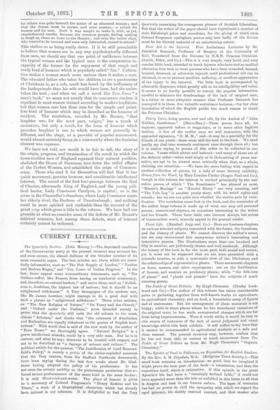CURRENT LITERATURE.
The Quarterly Review. (John Murray.)—The depressed condition of the Conservative party at the present moment may account for, and even excuse, the dismal dullness of the October number of its naost venerable organ. The best articles are three which are essen- tially informative, such as "The Fish Supply of London," "Vauban and Modern Sieges," and "Ten Years of Italian Progress." In the last, there appetti some extraordinary statements, such as, "The Italians suffer, like France, from having no territorial aristocracy, and, therefore, no natural leaders ;" and naYve ideas, such as "Selfish- ness is, doubtless, the highest law of nations ; but it should be an enlightened selfishness." A Tory demagogue of the modern sort, like Mr. James Lowther, might manage to do a good deal with each a phrase as "enlightened selfishness." Three other articles, on "The New Religion of Nature," "Dr. Pusey and the Church," and "Oxford under the Puritans," seem intended mainly to prove that the Quarterly still nails the old colours to the mast, alkors "Atheism," and thinks that "the extremes of Absolutism and Radicalism are equally abhorrent to the genius of Eoglish insti- tutions." With much that is said of the new work by the author of "Ent: Homo" we thoroughly agree. "Natural Religion" is a grave intellectual mistake, made by a very able man. But be is in earnest, and what he says deserves to be treated with respect, and not to be described as "a farrago of science and culture," The political article for the quarter, "The Justification of Lord Beacons- field's Policy," is merely a precis of the thrice-exploded nonsense that the Tory orators, from Sir Stafford Northoote downwards, have been saying during the last few weeks about Mr. Glad- stone having adopted the policy of his predecessor. It has not even the artistic acridity or the picturesque pessimism that re- Bayed recent performances of the same kind in the same Review ; it is only Blackwood-and-water. The place of honour is given to a summary of Colonel Fergusson's "Henry Erskine and his Times," a work of a biographical character, which has already been noticed in our columns. It is delightful to find the Tory Quarterly canonising the courageous pioneer of Scottish Liberalism, But that the writer of the paper should have reproduced a number of stale Edinburgh jokes and anecdotes, for the giving of which even Colonel Fergusson apologises, proves only how badly off the Review must be for literary material of an entertaining nature.


































 Previous page
Previous page